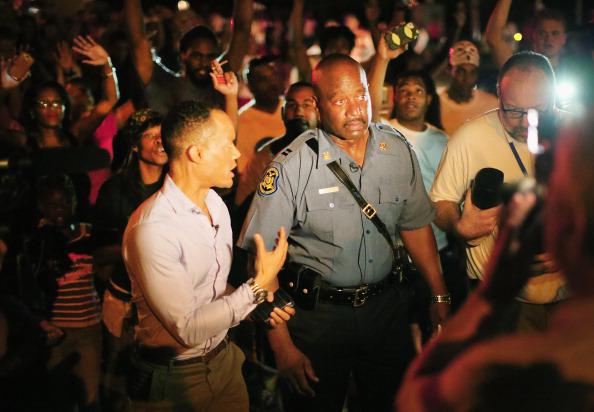Ron Johnson is the Missouri Highway Patrol captain who took over patrol in Ferguson Thursday night; Johnson, a Ferguson native, spoke and walked with protesters and supervised a force that presented itself much less aggressively than the quasi-military SWAT teams that had confronted residents on previous days. The result, by all accounts, was a significantly less tense evening. “There were not any calls for service, we did not deploy any tear gas, we did not make any arrests,” Johnson said when he met minutes ago with members of the media and local citizens.
He seemed to have been taken by surprise by Ferguson Police Chief Thomas Jackson’s release this morning of an incident report that alleges slain teen Michael Brown stole a box of cigars from a convenience store and assaulted the store’s clerk on Saturday. “Today I will meet with the chief of Ferguson and talk about what was released and try to get a copy,” he said, emphasizing several times that he will be returning to the protest site today to meet with residents. “This afternoon I will be walking back down to the QuikTrip, and I will talk to the people there and explain what I see in the packet and some of the questions that may have been unclear in the presentation this morning, I will try to make those clear.”
He also spoke more broadly about the response to Brown’s death: “This inner anger … we have to make sure that we don’t burn down our own house, that we don’t go down there and vandalize our own buildings. We can stand on the sidewalk and we can talk about our issues and we can talk about what we want and what we need and a conversation that needs to happen and we can make that happen. But what I don’t want is us to go down and burn down our own neighborhood. That doesn’t prove a point. That does not solve the issue. That hurts this community, and that’s what I don’t want.”
One questioner asked him a broad question about race relations and justice. “The governor talked about old wounds,” Johnson said. “This is an old wound. It’s time to stop saying it’s an old wound, and close it for good.” Later he spoke about the future of the community: “Yesterday we saw what it could be. We saw what it should be. And we saw what it will be.”
Read the rest of Slate’s coverage of the protests in Ferguson.
